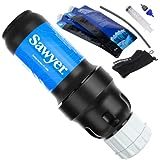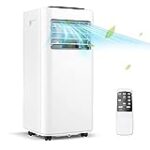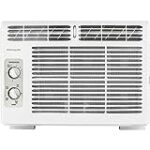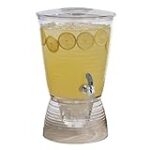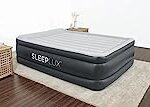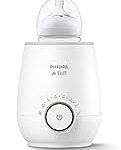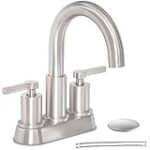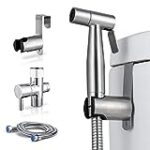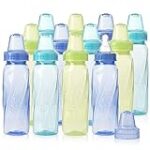🌅 Introduction
Welcome to our comprehensive camping water filters buying guide! When it comes to outdoor adventures, having access to clean and safe drinking water is crucial. Camping water filters are the perfect solution to ensure you stay hydrated while exploring the great outdoors. In this guide, we will walk you through everything you need to know about choosing the right water filter for your camping needs. From different types of filters to key features and considerations, we’ve got you covered. So, let’s dive in and find the perfect camping water filter to quench your thirst on your next wilderness expedition!
🏆 Our Top 5
- Removes Bacteria & Parasites: The Microfiltration Membrane Removes 99.999999% Of Waterborne Bacteria (Including E. Coli And Salmonella), And 99.999% Of Waterborne Parasites (Including Giardia And Cryptosporidium)
- Removes Microplastics: Removes The Smallest Microplastics Found In The Environment (Down To 1 Micron), And Reduces Turbidity Down To 0.2 Microns
- Rigorous Testing: All Claims Are Verified With Laboratories Using Standard Testing Protocols Set By The Us Epa, Nsf, Astm For Water Purifiers
- Long Lifetime: The Microbiological Filter Will Provide 4,000 Liters (1,000 Gallons) Of Clean And Safe Drinking Water With Proper Use And Maintenance
- Make An Impact: For Every Lifestraw Product Purchased, A School Child In Need Receives Safe Drinking Water For An Entire School Year.Bpa Free Materials
- 5-Stage Efficient Filtration: With adoption of premium-quality coconut shell activated carbon, 0.1 um ultrafiltration membrane and other raw materials, the Water Filter Straw can effectively reduce harmful substances like chlorine, particulates, sediment, stones, sand, dirt, bad taste &odor in water to ensure the water safety and deliver better drinking experience.
- Professional Combination: Waterdrop Gravity Water Filter Straw with 1.5 gal Gravity-Fed Water Bag is an exclusive water purification combination created for outdoor activities and first aid survival. The large-capacity water bag can hold up to 1.5 Gallons of water at a time, which is about 11 bottles of 500 ml bottled purified water, and can meet the all-day demand for outdoor water drinking.
- Longer Lifespan: The Waterdrop Filter straw can provide safe drinking water up to 1,400 gallons (5,300 liters), and ensures the maximum water flow rate of up to 700 ml/min to provide more relaxed outdoor water drinking experience.
- Recyclable Straw: With innovative backwash purifier function, the inside of the Water Filter Straw can be kept clean at all times and it is recyclable, safe and pollution-free. If the water flow decreases or the filter has been used for a long time, you can remove the mouthpiece, flush it with clean water. (Standard water bag can be used or pop bottle with thread diameter of 27.5mm can be filled clean water for backwashing the filter straw.)
- Versatile Uses: The Water Filter Straw can be connected with water bags or water bottles to filter water for drinking. Both ends of it can be disassembled and connected with the water bags and the water bottles to offer you clean drinking water anytime anywhere.
- Advanced 6-Step Water Filtration System: Experience the extraordinary power of Hex-Flow Technology & its remarkable 6-step filtration process. Every layer works together to provide you with great tasting drinking water that is exceptionally clean
- Superior Filtration Standard: The combined GAC & KDF layers boost your water’s purity by removing unpleasant taste, odor, chlorine, sediment, and more. Our camper water filters are also bacteriostatic and control mold & bacteria growth when not in use
- 20-Micron Protection with High Flow: A 20-micron internal sediment filter protects against silt, sediment, etc. that may enter your fresh drinking water supply. The wide body design provides increased flow, so your water runs efficiently.
- Certified Lead Free: Our water filter system is independently tested & listed to standards NSF/ANSI 42 & NSF/ANSI 53. It’s CSA lead-free content certified to NSF/ANSI 372 & compliant with all federal & state-level lead-free laws.
- Versatile and Essential: This multi-purpose clean water filter isn't just a must have among camping accessories and boat accessories. Easily attach the filter to any standard hose to enjoy clean water for your pets, gardening, & spot-free car washing
- 【Upgraded Filtration】Certified by NSF 42, the RV water filter significantly improves the taste of drinking water to provide pure-tasting water while retaining minerals that are good for the human body. Effectively reduces chlorine, bad taste, odor, and sediment.
- 【Features】Service flow: 0.5 gpm, capacity: up to 1056 gallons, max working pressure: 60 psi, operating temperature: 34℉ -100℉ , lifespan: 3 months(each), microns diameter filter: 20.
- 【Long Lasted】Providing clean, crisp drinking water with every sip at its best, the inline water filter has a lengthy lifespan and each may last an entire camping season for 3 months. This gives you an incredible method to enjoy outdoor activities.
- 【NSF and BPA FREE Certified】Lead-free and BPA-free, it uses GAC granular activated carbon and Kinetic Degradation Flux (KDF) to provide you with refreshing and tasty filtered water.
- 【Wide Applications】The RV inline water filter is simple to connect to a standard water hose or faucet. Perfect for boats, marine vehicles, and RVs. Excellent for cleaning cars, gardening, camping, farming, brewing, housework, pools, pets and spas. Meet so many needs of your daily life.
- ADVANCED 6-STEP FILTRATION TECHNOLOGY: Experience the extraordinary power of Hex-Flow Technology & its remarkable 6-step filtration process. Every layer works together to provide you with water that is exceptionally clean.
- CERTIFIED LEAD-FREE: These camping water filters are independently tested & listed to standards NSF/ANSI 42 & NSF/ANSI 53. They are CSA lead-free content certified to NSF/ANSI 372 & compliant with all federal & state-level lead-free laws.
- ACCESS TO PURE, GREAT-TASTING WATER: Enjoy clean water wherever you go. These RV inline filters reduce unpleasant tastes, odor, chlorine, sediment, etc. GAC filtration, combined w/ KDF controls bacteria & mold growth when the filters aren’t in use.
- PATENTED TECHNOLOGY & MADE IN THE USA: These in-line water filters are proudly made in the USA with top-notch materials and expert craftsmanship. The patented design has undergone rigorous testing and quality control to meet the highest standards.
- VERSATILE APPLICATIONS: Easily attach these multi-purpose filters to any standard garden or drinking water hose to receive cleaner drinking water. They’re great for campers, boats, pets, gardening, car washes, car detailing, & more.
🤔 How to choose?
1. Filtration Method
When choosing a camping water filter, the first thing to consider is the filtration method. There are several different types of filtration methods available, each with its own advantages and disadvantages. The most common types of filtration methods include:
– **Activated Carbon Filters**: These filters use activated carbon to remove impurities and improve the taste and odor of the water. They are effective at removing chlorine, chemicals, and some heavy metals. However, they may not be as effective at removing bacteria and viruses.
– **Ceramic Filters**: Ceramic filters are effective at removing bacteria, protozoa, and sediment from the water. They are durable and long-lasting, making them a great option for camping trips. However, they may not be as effective at removing viruses.
– **UV Filters**: UV filters use ultraviolet light to kill bacteria, viruses, and other microorganisms in the water. They are effective at purifying water and do not require any chemicals. However, they require batteries or a power source to operate.
– **Reverse Osmosis Filters**: Reverse osmosis filters use a semi-permeable membrane to remove impurities from the water. They are effective at removing a wide range of contaminants, including bacteria, viruses, chemicals, and heavy metals. However, they can be bulky and require a lot of maintenance.
2. Water Source
The next thing to consider when choosing a camping water filter is the source of water you will be filtering. Different filters are designed to handle different types of water sources, so it’s important to choose one that is suitable for your needs.
– **Tap Water**: If you will be filtering tap water, a basic activated carbon filter may be sufficient. These filters are designed to remove chlorine, chemicals, and improve the taste and odor of tap water.
– **River or Lake Water**: If you will be filtering water from rivers or lakes, you will need a filter that is capable of removing bacteria, protozoa, and sediment. Ceramic filters are a good option for this type of water source.
– **Backcountry Water**: If you will be filtering water from backcountry sources, such as streams or springs, you will need a filter that is capable of removing bacteria, viruses, protozoa, and sediment. UV filters or reverse osmosis filters are good options for this type of water source.
3. Portability
Portability is another important factor to consider when choosing a camping water filter. You want a filter that is lightweight and compact, making it easy to carry and transport during your camping trips.
– **Size and Weight**: Look for a filter that is small and lightweight, so it doesn’t take up too much space in your backpack. Consider the dimensions and weight of the filter before making a purchase.
– **Ease of Use**: Choose a filter that is easy to use and doesn’t require any complicated setup or maintenance. Look for filters with simple instructions and minimal parts.
4. Filter Lifespan
The lifespan of the filter is another important consideration. You want a filter that will last for the duration of your camping trip without needing to be replaced or cleaned too frequently.
– **Filter Capacity**: Consider the filter capacity and how much water it can filter before needing to be replaced or cleaned. Look for filters with a high filter capacity to minimize the need for maintenance.
– **Filter Replacement**: Find out how easy it is to replace the filter when it reaches the end of its lifespan. Look for filters that have readily available replacement filters.
5. Budget
Lastly, consider your budget when choosing a camping water filter. There are filters available at a wide range of price points, so it’s important to find one that fits within your budget.
– **Value for Money**: Consider the features and performance of the filter in relation to its price. Look for filters that offer good value for money and meet your specific needs.
– **Long-Term Costs**: Take into account the long-term costs of owning the filter, including the cost of replacement filters and any maintenance or upkeep required.
By considering the filtration method, water source, portability, filter lifespan, and budget, you can choose the perfect camping water filter that meets your specific needs. Remember to prioritize your health and safety by selecting a filter that effectively removes contaminants from the water, ensuring clean and safe drinking water during your camping adventures.
💡 What to Look for in a camping water filters?
1. Filtration Technology
When looking for a camping water filter, it is important to consider the filtration technology used. There are various types of filters available, each with its own advantages and limitations. One popular option is the **hollow fiber membrane** filter, which effectively removes bacteria, protozoa, and sediment from water. Another option is the **activated carbon filter**, which is effective in removing chemicals, odors, and bad taste from water. Some filters even combine multiple technologies for enhanced filtration performance.
For example, the Sawyer Mini Water Filter utilizes a hollow fiber membrane filter that can remove 99.99999% of bacteria and 99.9999% of protozoa, making it a reliable choice for camping trips.
2. Flow Rate and Capacity
The flow rate and capacity of a camping water filter are important factors to consider. The flow rate determines how quickly the filter can produce clean water, while the capacity refers to the total amount of water the filter can treat before needing replacement or maintenance.
A higher flow rate is desirable as it allows for quicker access to clean water, especially when you are in a hurry or have a large group of people relying on the filter. However, it is important to strike a balance between flow rate and filtration effectiveness.
For instance, the Katadyn Hiker Pro Water Filter has a flow rate of 1 liter per minute, making it a convenient choice for campers who need a quick supply of clean water. It also has a capacity of up to 750 liters, ensuring that it can last for extended camping trips.
3. Portability and Durability
When camping, it is crucial to have a water filter that is portable and durable. Look for filters that are lightweight and compact, so they can easily fit into your backpack without adding unnecessary weight. Additionally, consider the durability of the filter, as it will be exposed to various outdoor conditions.
The LifeStraw Personal Water Filter is a great example of a portable and durable camping water filter. It weighs only 2 ounces and is small enough to fit into your pocket. It is also made of high-quality materials that are resistant to impact and harsh weather conditions.
In conclusion, when choosing a camping water filter, it is important to consider the filtration technology, flow rate and capacity, as well as the portability and durability of the filter. By carefully evaluating these factors, you can ensure that you have a reliable and efficient water filter for your camping adventures.
🔍 How we picked?
1. Researching the Best Camping Water Filters
When it comes to camping, having access to clean and safe drinking water is essential. With so many camping water filters on the market, it can be overwhelming to choose the right one for your needs. That’s why we’ve done the research for you, so you can spend less time searching and more time enjoying the great outdoors.
We started by looking at a variety of factors that are important when selecting a camping water filter. These factors include filtration technology, filter lifespan, ease of use, portability, and customer reviews. By considering these aspects, we were able to narrow down our options and find the best camping water filters available.
2. Evaluating Filtration Technology
One of the most important aspects of a camping water filter is its filtration technology. There are several different types of filters available, including activated carbon filters, ceramic filters, and hollow fiber membrane filters. Each type has its own strengths and weaknesses, so it’s important to choose one that suits your specific needs.
Activated carbon filters are great for removing odors and improving taste, while ceramic filters are effective at removing bacteria and protozoa. Hollow fiber membrane filters, on the other hand, are capable of removing even the tiniest of particles, including viruses. By understanding the different filtration technologies, you can choose a camping water filter that meets your water purification requirements.
3. Considering Filter Lifespan and Ease of Use
Another important factor to consider when choosing a camping water filter is its filter lifespan and ease of use. Some filters require frequent replacements, while others can last for thousands of gallons of water. It’s important to choose a filter that suits your camping needs and frequency of use.
Additionally, the ease of use of a camping water filter is crucial, especially when you’re out in the wilderness. Look for filters that are lightweight, compact, and easy to assemble and disassemble. This will ensure that you can quickly and efficiently filter water without any hassle.
In conclusion, when choosing a camping water filter, it’s important to consider the filtration technology, filter lifespan, and ease of use. By doing thorough research and evaluating these factors, you can find the best camping water filter that meets your specific needs. So, before you head out on your next camping adventure, make sure you have a reliable and efficient water filter by your side.
💬 Frequently asked questions about camping water filters
1. What is a camping water filter and why do I need one?
A camping water filter is a portable device designed to remove impurities and contaminants from water sources found in the great outdoors. Whether you’re hiking, backpacking, or camping, having access to clean and safe drinking water is essential for your health and well-being.
2. How does a camping water filter work?
Camping water filters use various filtration methods to purify water. The most common types are activated carbon filters, ceramic filters, and hollow fiber membrane filters. Activated carbon filters absorb chemicals and improve taste, while ceramic filters physically block bacteria and protozoa. Hollow fiber membrane filters have microscopic pores that trap contaminants, ensuring clean water.
3. What should I consider when choosing a camping water filter?
When selecting a camping water filter, consider factors such as filtration capacity, weight, ease of use, and maintenance requirements. If you’re planning a longer trip, a filter with a higher capacity is crucial. Lightweight filters are ideal for backpackers, while easy-to-use filters are convenient for quick hydration on the go. Additionally, opt for filters that are easy to clean and maintain, as this will prolong their lifespan.
4. Can I use a camping water filter for all water sources?
While camping water filters are highly effective at removing most contaminants, they may not eliminate viruses. If you’re traveling to areas with known viral contamination, it’s advisable to use a water purifier or combine a filter with chemical treatment methods. Always check the specifications of the filter to ensure it meets your specific needs.
5. How often should I replace the filter?
The frequency of filter replacement depends on the filter type and usage. Some filters have a specified lifespan or filtration capacity, while others require regular cleaning and maintenance. It’s important to follow the manufacturer’s guidelines to ensure optimal performance. If you notice a significant decrease in water flow or a change in taste, it may be time to replace the filter.
Remember, investing in a high-quality camping water filter is an investment in your health and safety. Don’t compromise on clean water when exploring the great outdoors. As the famous outdoorsman John Muir once said, “Thousands of tired, nerve-shaken, over-civilized people are beginning to find out that going to the mountains is going home; that wildness is a necessity.” So, embrace the wildness, but always stay hydrated with a reliable camping water filter.
Last update on 2024-07-20 / Affiliate links / Images from Amazon Product Advertising API
